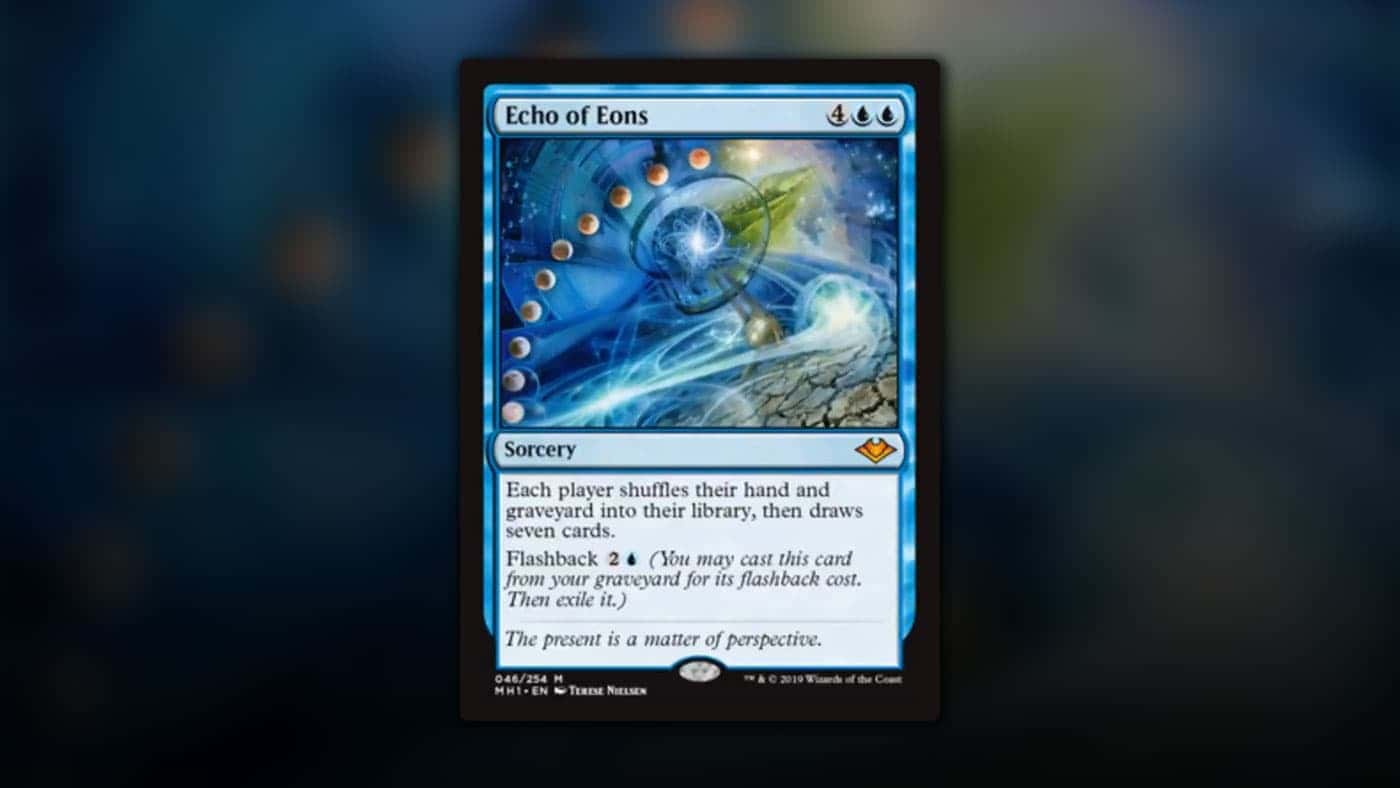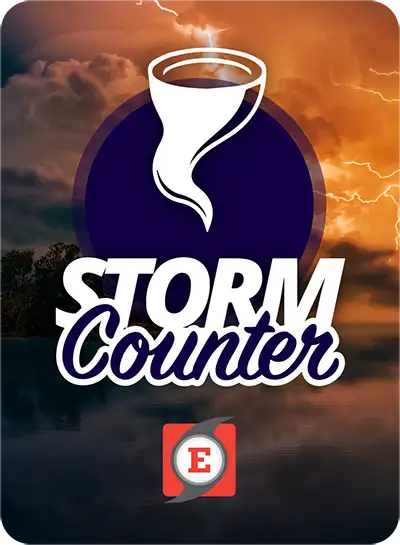After about a year of playing with [[Echo of Eons]], it has proved to be a complex and situational engine. Knowing when to cast [[Echo of Eons]], be more patient, or navigate to a different plan has become a pivotal part of playing The EPIC Storm properly. While it can be frustrating to cast [[Echo of Eons]] and appear to miss, there are optimizations to make to give [[Echo of Eons]] the highest odds of succeeding.
Factors for a Successful Echo of Eons
There are four main factors to determining how likely an [[Echo of Eons]] line is to being successful: Storm count, floating mana, number of tutor effects in the deck, and whether or not the [[Echo of Eons]] is “protected”. Barring situations involving a [[Mindbreak Trap]], having a higher Storm count before resolving the [[Echo of Eons]] will lead to a higher chance of drawing into a winning hand. The fewer spells that one needs to cast post [[Echo of Eons]] to hit lethal storm count, the better the [[Echo of Eons]] is. On average, an opening seven card hand will have one or two lands in it (which changes depending on which lands are already in play). This means that a hand has on average five extra Storm, assuming that all of those spells can be cast. Pre [[Echo of Eons]], however, Storm count is the least important factor in determining if one should play towards casting it. It’s just something to keep in mind when figuring out how likely an [[Echo of Eons]] is to win without passing the turn.
The most important factor to consider when setting up [[Echo of Eons]] is the floating mana. The quantity and the color of mana are both factors to consider. A common situation will involved having two copies of [[Lion’s Eye Diamond]] to crack with the [[Echo of Eons]]. Cracking them for blue mana and black mana and after casting [[Echo of Eons]] is the default set up. This is due to blue mana being valuable for casting multiple cantrips when necessary, and the first black mana can often be converted into many more. These colors may change on a few factors: Storm count and rituals and tutor effects left in the deck. If the Storm count is higher enough, leaving drawing [[Tendrils of Agony]] as an out is a good play. If [[Dark Ritual]] has been exiled by a [[Surgical Extraction]] effect or if most of the copies of [[Wishclaw Talisman]] are in play, floating red mana may be preferable. When floating just one mana, I tend to float a blue mana unless winning on the same turn is crucial or if the storm count is within one or two of being lethal. An available land drop is almost as good as having a floating mana, especially if most of the fetch able lands are not in play. On the data page, there is a section that details some of the approximate percentages for [[Echo of Eons]] based on floating mana. While that math is very situationally dependent, it can be used to figure out relative percentages. Two mana floating leads to a likely win on that turn, while one floating mana is closer to 40 percent. One smaller play that can matter is not cracking fetch lands before casting [[Echo of Eons]]. Given that the fetch land just shuffles back into the library, it does not lower the chances of drawing lands after resolving [[Echo of Eons]]. By not cracking the fetch land before, it can find the color of mana actually needed instead of locking in a guess before all of the information is known.
The EPIC Storm is mostly composed of cards that make mana, and the bottleneck of [[Echo of Eons]] lines tends to be finding a way to win the game. Being mindful of the number of business spells that one could draw into with an [[Echo of Eons]] is important for approximating its odds of success. With eight tutor effects in the deck, the probability of drawing at least one is about 60 percent. This assumes a few variables, such as deck size and the number of tutors being shuffled into the deck. The fewer tutors available, the lower that probability is. These could be situations like having cast multiple copies of [[Burning Wish]] or activating copies of [[Wishclaw Talisman]]. There can also be an interesting tension between leaving a [[Wishclaw Talisman]] in play or having an extra two mana available post [[Echo of Eons]]. This decision comes down the amount of mana available with playing the [[Wishclaw Talisman]] and the amount without playing it. If there is not a land drop available and no floating mana, then I generally do not cast the [[Wishclaw Talisman]]. Otherwise, having more permanents in play is more advantageous.
A protected [[Echo of Eons]] is one that resolves after a [[Veil of Summer]] or [[Defense Grid]] has resolved. Limiting the amount of interaction that an opponent can have greatly increases the odds of winning the game because the only probabilities that matter at that point are the ones for your own library and not the opponent’s deck. The probability of winning with [[Echo of Eons]] can be expressed by P(being able to win the game) * !P(opponent being able to interact). If the opponent is unable to interact, the second part of the expression becomes one, which is much better for us. In matchups, such as prison decks, where opponents are less likely to interact in the first place, having a protected [[Echo of Eons]] matters much less, though keeping cards such as [[Mindbreak Trap]] or [[Surgical Extraction]] in mind is important
Echo of Eons at its best
There are situations where regardless of the above factors casting [[Echo of Eons]] is correct. The most common of these is having no other options, such as an opponent has a lethal attack in play, and there is not enough mana and/or life to cast [[Ad Nauseam]]. These desperation [[Echo of Eons]] often have few mana floating and lower odds of success. They also feel the worst to miss on, but that is not a function of [[Echo of Eons]] being a bad card or applying it in the wrong situation. Having [[Echo of Eons]] available gave a chance to win a game that may otherwise have been impossible to win.
Racing an opponent’s lock pieces is another place to play towards [[Echo of Eons]] more aggressively. A turn-one [[Echo of Eons]] with few mana floating is perfectly acceptable against matchups like Eldrazi, where giving them a turn can be catastrophic. A fast [[Echo of Eons]] is also often correct against Burn over an [[Ad Nauseam]] line if the opponent has a few untapped mana and access to [[Fireblast]]. This does need to be weighed against the odds of drawing the opponent into lethal burn spells.
A rare, but hilarious situation that comes up against [[Doomsday]] or Merfolk is the deterministic [[Echo of Eons]]. Unlike [[Diminishing Returns]], [[Echo of Eons]] can be used to kill an opponent if the number of cards in their hand, library, and graveyard combined are less than or equal to seven. While rare, it is something to notice if an opponent passes the turn after exiling their library.
Deciding to Echo of Eons
When at lower life totals, a decision between casting [[Echo of Eons]] and [[Ad Nauseam]] becomes close. [[Echo of Eons]] always draws seven cards, while [[Ad Nauseam]] draws about one-and-a-half cards per life available. In the realm of 6-9 life, both engines draw about the same number of cards. Choosing between the two in the moment can be difficult. Many of the same factors of just choosing a spot to cast [[Echo of Eons]] apply here. [[Ad Nauseam]] can be risker due to costing more mana and drawing an indeterminate amount of cards, but it does not carry the risk of drawing the opponent into their interaction. I tend to err on the side of casting [[Ad Nauseam]] most of the time against blue decks, but it is important to evaluate each situation individually.
[[Echo of Eons]] can also be a tool to help reset the game. It is not necessary to win the same turn as casting [[Echo of Eons]]. Against blue decks especially, dumping a bunch of permanents into play, casting [[Echo of Eons]] and passing the turn can be a good sequence. By having extra permanents in play, it breaks the parity of [[Echo of Eons]] and can help recoup some of the card disadvantage from a card like [[Chrome Mox]].
It is not always necessary to cast [[Burning Wish]] and [[Echo of Eons]] in the same turn. If there is not imminent danger, the untapping with the ability to cast [[Echo of Eons]] can be very powerful. This can also be a strategy to help beat a [[Mindbreak Trap]].
When Not to Echo of Eons
[[Echo of Eons]] is the cheapest line in The EPIC Storm. Often, the option to cast it comes up before any of the other lines. Just because it is possible to cast [[Echo of Eons]], it does not mean that one should cast [[Echo of Eons]]. This is especially true if the game state is continuing to get better. If there is the option to work towards a more protected line or just develop more mana, that can be better. The EPIC Storm has a reputation for being “black Belcher”, but all of the recent changes have pushed TES towards being a slower deck that scales better into later turns. There is not nearly as much pressure to do something, especially when that something is [[Echo of Eons]].
Taking the time to setup and build towards a line is something to do regardless of [[Echo of Eons]]. Identifying a matchup early and what is possible with a given hand is key to planning towards a winning line. This informs cantrip decisions, fetching decisions, and when the critical turn needs to be. In some matchups, such as Delver, if an opponent’s hand is particularly aggressive, understanding that there are a few more turns to set up [[Echo of Eons]] or [[Peer into the Abyss]] instead of [[Ad Nauseam]] can change what cantrips are looking for.
Conclusion
[[Echo of Eons]] is a hard card to play correctly. There can be obvious cases of when to cast it, but also less clear cases. It does not always need to win the turn it is cast and can be a rebuilding tool. Prioritizing a high amount of floating mana can be the key to winning with [[Echo of Eons]] as well as optimizing small things like fetch lands. [[Echo of Eons]] takes practice to recognize when it is appropriate. Playing more with it helps more than anything else.










